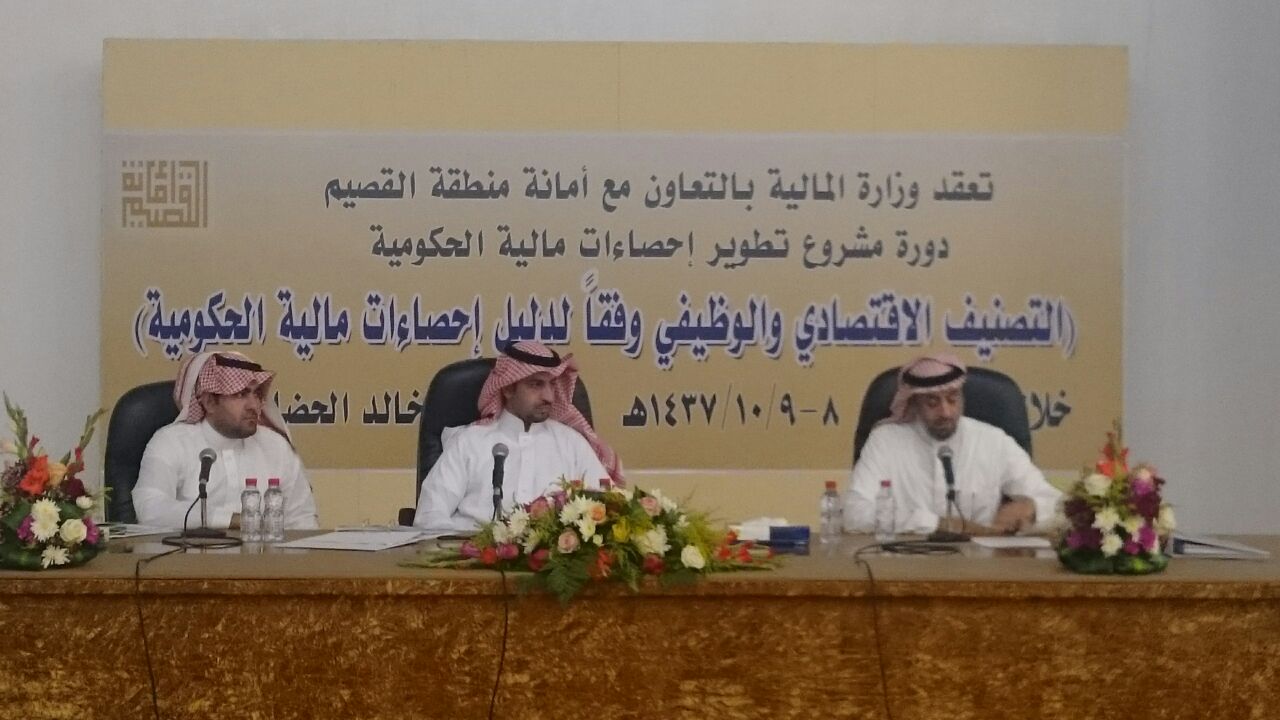The Ministry of Finance, represented by the Committee of the Government Finance Statistics Development Project, has organized, on Wednesday, 10/08/1437 H, a training course on " Economic and Functional Classification According to the GFSM . This training course is directed to municipalities and secretariats (Amanahs) in the Kingdom
This training course comes out of the Ministry's keen interest to hold this it at the headquarters of municipalities and secretariats in the Kingdom in order to make it easier for employees to attend these sessions, to get benefits and to achieve the success and desired outcome.
Mr. Ali bin Ayed Al Hasosah, the Secretary of the Committee of GFSM Development Project and the Economic Adviser, explained in his speech during the session, the importance of reclassifying the state budget according to economic classification of GFSM and this should be taken as a foundation to the public finance analysis, as well as, there is a need for accurate and correct data in general; and government finance data in particular in order to analyze the financial data and to identify the effects on overall economic activity through its impact on growth, inflation, unemployment, balance of payments and public debt, where the importance of GFSM comes as a key element in the analysis of public finance, stressing its importance role in implementing the suitable financial programs, monitoring their implementation and to control the economic policies.
He goes on to say that this training course covers a number of important topics, such as exposing and reviewing the key concepts of the methodology of Ggovernment Finance Statistics in 2014 Manual, and exploring classification of revenues, expenses, assets and liabilities, in addition to the functional classification and general view about the impact of these on information technology. He goes on to say that these topics have been provided through lectures, practical workshops and case studies designed to polish up knowledge; to acquire new useful skills and practical guidance for trainees in their work.
At the end of his speech, Mr. Al Hassosah passes the greetings and appreciation of the Deputy Minister for International Financial Affairs, the head of the Committee of GFSM development project Dr. Sulaiman bin Mohammed Al-Turki for the efforts and arrangements made by the secretariats (Amanah) to make success to this training course, wishing all participants to achieve the desired outcome.
It is worth mentioning that these courses are held in all regions of the Kingdom by two teams under the direct supervision and follow-up of Dr. Sulaiman Al-Turki, where the first group is composed of: Khaled Al-Humaidhi, Ali Al Hassosah, Mohammed Al-Dakan, Abdulrahman Al Faraj, Firas Al-Omar, Mohammad Hakim and Salman bin Madayi, which covers the secretariats and municipalities of: Al-Madinah Al-Munawarah region, Jeddah province, Makkah Al Mukarramah region, Taif province, Baha region, Asir region, Najran region and Jizan region.
The second group consists of Mohammed Al Mutawa, Hamdan Al-Otaibi, Ahmed Mughrabi, Sultan Al-Otaibi, Suleiman Al-Matroudi, Issa Al-Mutairi and Majid Albawardi, which covers the following secretariats and municipalities: Al-Qassim region, Hail region, Al-Jouf region, the Northern Border region , Tabuk region, the Eastern Province and Al-Ahsa region. This group will run until 06.11.1437 H, in the presence and participation of the following members of the Committee of GFSA development project: Abdullah Al-Askar, Hathal Al-Faizi, Khaled Al-Humaidhi and Abdullah Al -Ghamlas.
Dr. Sulaiman Al-Turki ,the Deputy Minister for International Financial Affairs, the head of the Committee of GFSA Development Project, briefed His Excellency the Minister of Finance Dr. Ibrahim bin Abdulaziz Al-Assaf about the first results of the training courses that have been achieved. His Excellency the Minister expresses his thanks and appreciation for this effort, the communication with officials in their workplaces and the training of approximately 1,000 employees, wishing them all successes and to achieve the objectives of the course.

.jpeg)
.jpeg)
.jpeg)